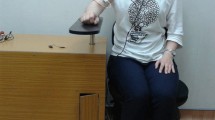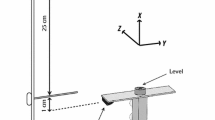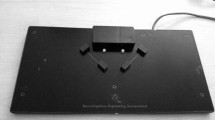Abstract
Objectives
Primitive reflexes (PR) generally disappear early in life but may reappear later, in which case they are often associated with chronic neurological conditions, such as dementia or Parkinson’s disease. Studies have shown that the presence of PRs may be indicative of both the severity and rate of progression of these diseases and may be the result of disinhibition of cortical networks. The association between PRs and cognitive function in usual ageing is unclear. We investigated whether the occurrence, amplitude, and persistence of four nociceptive (glabbelar tap, palmomental, pollicomental, and snout reflexes), three prehensile reflexes (suck, palmar grasp, and rooting), and two other reflexes (mouthopen finger–spread and nuchocephalic reflexes) were related to performance in specific cognitive domains in normal ageing individuals.
Methods
Four–hundred and seventy normal aging participants (25–82 years) in the Maastricht Aging Study (MAAS), were included in the study. They were neurologically and cognitively screened at baseline and were retested after 3 (only individuals aged 50 years and older at baseline) and 6 years.
Results
The prevalence of most PRs increased with age: 47% of men aged 25–45 years had at least one PR, compared with 73% of men aged 65–85 year (p = 0.002). In women these percentages were 51 and 75, respectively (p=0.008). The prevalence, amplitude, and persistence of PRs were unrelated to cognition at baseline or at the 3– or 6–year follow– up.
Conclusions
The prevalence of particularly nociceptive reflexes rises substantially with increasing age in normal individuals. However, the presence of PRs cannot be considered to be a marker of cognitive decline in normal aging individuals.
Similar content being viewed by others
References
Bosma H, van Boxtel MPJ, Ponds RWHM,Houx PJ, Jolles J (2000) Pesticide exposure and risk of mild cognitive dysfunction. Lancet 356:912–913
Brand N, Jolles J (1985) Learning and retrieval rate of words presented auditory and visually. J Gen Psychol 112:201–210
Buckley AC (1927) Observations concerning primitive reflexes as revealed in reactions in abnormal mental states. Brain 50:573–578
De Ajuriaguerra J, Rego A, Tissot R (1963) The oral reflex and some oral activities in the dementia syndromes of old age. Le réflexe oral et quelques activités orales dans les syndromes démentiels du grand âge. Encéphale 52:189–219
De Bie SE (1987) Standaardvragen 1987:Voorstellen voor uniformering van vraagstellingen naar achtergrondkenmerken en interviews. Standard questions 1987: Proposal for uniformization of questions regarding background variables and interviews. Leiden University Press, Leiden
De Renzi E, Barbieri C (1992) The incidence of the grasp reflex following hemispheric lesion and its relation to frontal damage. Brain 115:293–313
Delwaide PJ,Dijeux L (1980) Réflexes néonateaux et dyskinésies buccolinguo– faciales dans la démence sénile. Neonatal reflexes and bucco–linguofacial dyskinesias in senile dementia. l’Actualité en Gérontologie 6:126–133
Franssen EH,Kluger A, Torossian CL, Reisberg B (1993) The neurologic syndrome of severe Alzheimer’s disease. Relationship to functional decline. Arch Neurol 50:1029–1039
Franssen EH, Reisberg B (1997) Neurologic markers of the progression of Alzheimer’s disease. Int Psychogeriatr 9:297–306
Galasko D,Kwo–on–Yuen PF,Klauber MR, Thal LJ (1990) Neurological findings in Alzheimer’s disease and normal aging. Arch Neurol 47:625–627
Hogan DB, Ebly EM (1995) Primitive reflexes and dementia: results from the Canadian Study of Health and Aging. Age Ageing 24:375–381
Houx PJ, Jolles J,Vreeling FW (1993) Stroop interference: Aging effects assessed with the Stroop Color–Word test. Exp Aging Res 19:209–224
Isakov E, Sazbon L, Costeff H, Luz Y, Najenson T (1984) The diagnostic value of three common primitive reflexes. Eur Neurol 23:17–21
Jenkyn LR,Walsh DB, Culver CM, Reeves AG (1977) Clinical signs in diffuse cerebral dysfunction. J Neurol Neurosurg Psychiatry 40:956–966
Jolles J,Houx PJ, van Boxtel MPJ, Ponds RWHM (eds) (1995) Maastricht Aging Study: Determinants of cognitive aging.Neuropsych Publishers, Maastricht
Jolles J,Houx PJ,Vreeling FW,Verhey FRJ (1993) Cognitive aging, biological life events and primitive reflexes. Neurosci Res Comm 13(Suppl 1):S47–S50
Junque C, Pujol J,Vendrell P, Bruna O, Jodar M, Ribas JC,Vinas J, Capdevila A,Marti–Vilalta JL (1990) Leukoaraiosis on magnetic resonance imaging and speed of mental processing. Arch Neurol 47:151–156
Kobayashi S,Yamaguchi S, Okada K, Yamashita K (1990) Primitive reflexes and MRI findings, cerebral blood flow in normal elderly. Gerontology 36:199–205
Luteijn F, van der Ploeg FAE (1983) Handleiding Groninger Intelligentietest (GIT) Manual Groningen Intelligence Test. Swets and Zeitlinger, Lisse, The Netherlands
Metsemakers JFM,Höppener P, Knottnerus JA,Kocken RJJ, Limonard CBG (1992) Computerized health information in the Netherlands: A registration network of family practices. Br J Gen Pract 42:102–106
Miller EK (2000) The prefrontal cortex and cognitive control. Nat Rev Neurosci 1:59–65
Miller EK, Cohen JD (2001) An integrative theory of prefrontal cortex function. Annu Rev Neurosci 24:167–202
Moller JT, Cluitmans P, Rasmussen LS, Houx P, Rasmussen H, Canet J, Rabbitt P, Jolles J, Larsen K,Hanning CD, Langeron O, Johnson T, Lauven PM, Kristensen PA, Biedler A, van Beem H, Fraidakis O, Silverstein JH, Beneken JEW,Gravenstein JS, et al. (1998) Longterm postoperative cognitive dysfunction in the elderly: ISPOCD1 study. Lancet 351:857–861
Molloy DW, Clarnette RM,McIlroy WE,Guyatt G, Rees L, Lever J (1991) Clinical significance of primitive reflexes in Alzheimer’s disease. J Am Geriatr Soc 39:1160–1163
Rabbitt P,Diggle P, Smith D,Holland F, Mc Innes L (2001) Identifying and separating the effects of practice and of cognitive ageing during a large longitudinal study of elderly community residents. Neuropsychologia 39:532–543
Reisberg B, Franssen EH,Hasan SM, Monteiro I, Boksay I, Souren LE, Kenowsky S, Auer SR, Elahi S, Kluger A (1999) Retrogenesis: clinical, physiologic, and pathologic mechanisms in brain aging, Alzheimer’s and other dementing processes. Eur Arch Psychiatry Clin Neurosci 249(Suppl 3):28–36
Rey A (1964) L’examen psychologique dans les cas d’encéphalopathie traumatique. Psychological assessment in cases of traumatic brain injury. Presses Universitaires de France, Paris, France
Schott JM, Rossor MN (2003) The grasp and other primitive reflexes. J Neurol Neurosurg Psychiatry 74:558–560
Smith A (1968) The Symbol Digit Modalities Test: A neuropsychological test for economic screening of learning and other cerebral disorders. Learning Disorders 36:83–91
Stroop JR (1935) Studies of interference in serial verbal reactions. J Exp Psychol 18:643–662
Tisserand DJ, Pruessner JC, Sanz Arigita EJ, van Boxtel MPJ, Evans AC, Jolles J,Uylings HBM (2002) Regional frontal cortical volumes decrease differentially in aging: An MRI study to compare volumetric approaches and voxel–based morphometry. Neuroimage 17:657–669
Van Beijsterveldt CEM, van Boxtel MPJ, Bosma H,Houx PJ, Buntinx F, Jolles J (2002) Predictors of attrition in a longitudinal cognitive aging study: The Maastricht Aging Study (MAAS). J Clin Epidemiol 55:216–223
Van Boxtel MPJ, Buntinx F,Houx PJ, Metsemakers JFM,Knottnerus JA, Jolles J (1998) The relation between morbidity and cognitive performance in a normal aging population. J Gerontol 53A:M146–M154
Van Tiggelen CJ (1983) The Bracha reflexes.Neurological indicators of localisation of brain damage. Implications for diagnosis and therapy of organic mental disorders. Aktuelle Gerontol 13:195–200
Vreeling FW,Houx PJ, Jolles J,Verhey FR (1995) Primitive reflexes in Alzheimer’s disease and vascular dementia. J Geriatr Psychiatry Neurol 8:111–117
Vreeling FW, Jolles J,Verhey FRJ,Houx PJ (1993) Primitive reflexes in healthy, adult volunteers and neurological patients: methodological issues. J Neurol 240:495–504
Zafeiriou DI (2004) Primitive reflexes and postural reactions in the neurodevelopmental examination. Pediatr Neurol 31:1–8
Author information
Authors and Affiliations
Corresponding author
Rights and permissions
About this article
Cite this article
van Boxtel, M.P.J., Bosma, H., Jolles, J. et al. Prevalence of primitive reflexes and the relationship with cognitive change in healthy adults. J Neurol 253, 935–941 (2006). https://doi.org/10.1007/s00415-006-0138-7
Received:
Revised:
Accepted:
Published:
Issue Date:
DOI: https://doi.org/10.1007/s00415-006-0138-7




